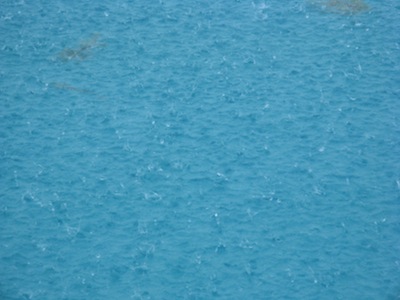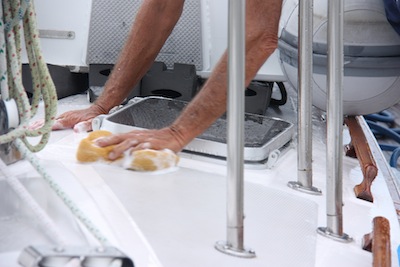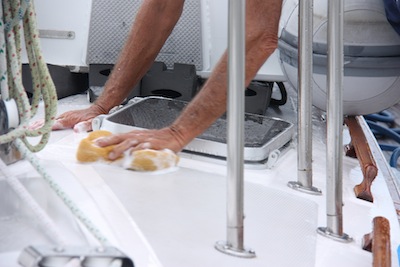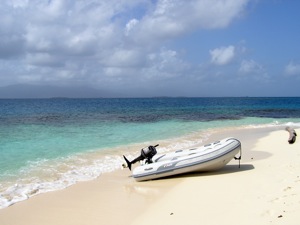We’re all familiar with those hard core boaters who thoroughly wash every crystal of salt off their boats after each 2 hour sail? We’ve even been known to call them anal … but turns out, they’re RIGHT. Despite loving to sail in salt water, salt is NOT our friend.
As cruisers, we all notice that our stainless remains relatively “pox” free when hanging out in the marina, but the minute we go cruising for a few months, the stainless immediately sprouts a fresh crop of “pox”. It’s the salt.
We anchored next to a boat in Hopetown one year and every morning, he was up meticulously wiping down his stainless and varnish using the fresh water dew and a soft cloth. We thought: “this guy’s nuts – he takes cleaning the boat to a level unheard of at anchor!”. But last year in the Exumas, guess what we did … well maybe I should say David did since crack of dawn is not my best hour of the day … sure enough David’s out there wiping down stainless & varnished teak. Why?

Salt on stainless almost immediately begins to corrode and form rusty looking spots or “pox”. Stainless is the first place you’ll notice the harmful effects salt has on everything on the boat. But if salt is left on gel coat, it causes pitting and chalking and the crystals can cause scratches and abrasions. And the same with isenglass and every other boat part. The bottom line is salt has an amazing ability to turn even a brand new boat into an “old” boat very quickly. Very sad.
And out cruising, especially where fresh water is in short supply, washing down a boat daily simply isn’t reality. But the minute we stop in a marina with adequate water, guess what we do. Out cruising an occasional deluge is welcomed as a way to rid ourselves and Winterlude of the sticky yucky salt accumulations (and can be a good way to get a bit of laundry done as well!).
Unfortunately, it’s not as simple as a quick spray with a pressurized water hose nozzle, although that’s certainly a good start! Make sure to get the salt OFF — salt is notorious for clinging to surfaces even after you’ve rinsed with fresh water!
First, know that you’re going to have to de-salt everything – not just the exterior of the enclosure, the interior is salty too. So while you’re washing down the boat, be sure to rinse the inside of the cockpit and enclosure, rinse as far up the mast as possible from the deck (be careful if there’s any wind, it’s annoying to be walking down a dock and get deluged because some guy on a sportsfisherman WAY up on top is washing down the boat!).
Pay particular attention to pulleys and deck hardware – Scanmar (Monitor Windvane) recommends we squirt pressure water inside all the pulleys and gears on the self-steering mechanism. Autohelm’s manual recommends squirting fresh water INSIDE the wheel pilot autopilot – there’s a particular opening they show in the manual. And we also spray off the outboard on the rail, the radar dome, the arch, the winches, the wind generator and it’s working parts, lots to get salt off of, not just the deck. Obviously cover the electronics and be careful when spraying around that area.
 Starting at the top, go section by section of the boat, rinsing only that section. (Don’t forget before you quit to rinse and wash the hull as well.) We try not to use the high pressure setting because depending on the pressure, that water can work itself under hatches and in places you’re really don’t want water to go. By the time we rinse the entire boat and then go back, it’s dried and we have to rinse again. So we just do a section at a time. It’s important to get everything wet — those wicked salt crystals take a couple of minutes to dissolve in fresh water.
Starting at the top, go section by section of the boat, rinsing only that section. (Don’t forget before you quit to rinse and wash the hull as well.) We try not to use the high pressure setting because depending on the pressure, that water can work itself under hatches and in places you’re really don’t want water to go. By the time we rinse the entire boat and then go back, it’s dried and we have to rinse again. So we just do a section at a time. It’s important to get everything wet — those wicked salt crystals take a couple of minutes to dissolve in fresh water.
After waiting a couple of minutes for the salt to begin to dissolve, we spray it again and then use a sponge to hand wipe it down — make sure it’s good & wet before you start using a sponge or deck mop – otherwise you risk grinding those abrasive salt crystals into the gelcoat or paint. Not good!!!

We use WoodyWax Wash but whatever cleaner you use, make sure it’s non-abrasive, many detergents contain abrasives. (see the post: How To Wash Your Boat Without Stripping the Wax) Before we used WoodyWax Wash, we always used Dove or Joy. Take your pick, but make sure it’s non-abrasive. And don’t use an abrasive sponge or mop unless you’re working on a specific stain. Similarly, be very careful with chlorinated cleansers, they may be fine for a bird crap stain, but you don’t want to use them all over the boat as they’re much harsher on the gelcoat.
Several years ago there was a brand new boat in our marina. But the owners didn’t see the need to fresh water wash the boat and now, 10 years later, it looks older than our almost 30 year old boat. Simple things make a big difference when it comes to life in salt water!
Anyone have other techniques or have I missed something important? Please leave a comment and share! Cheers! Jan














On this cleaning theme, I discovered that toothpaste is an awesome spot cleaner for getting rid of any red wine or other related stains that may occur if ever you spill any on your gel coat. Just put a blob on an old toothbrush and brush around stain. Some owners do not permit red wine to be drunk in the cockpit for that very reason. Gel coat is porous and aborbs red wine if you do not clean it up immediately.
Salt water and salt spray can even have bad effects on buildings and houses near the shore. rocky shorelines can kick up a lot of spray and the wind can carry it considerable distances. Windows get foggy with salt, wood can age rapidly, and anything with iron in it corrodes rapidly. The same things you see on a boat. The cure is the same, to regularly wash off the salty water with fresh water and non-abrasive detergent. Glass windows are especially important as the salt will etch them given time and then they can’t be cleaned.
Good information Leon! Since we don’t have a physical location near salt water, I have no experience with damaging effects on anything but our boat.
This is really interesting, so there IS a purpose in being particularly careful in cleaning your boat! Every boatowner should read this
And lots of folks are raving about Salt-away. They say it dissolves the salt without having to scrub. I’ve not used it so I can’t give you anymore info other than a lot of power boaters in Jacksonville’s West Marine bought it up by the gallon.
Kb
Plexiglass needs a special cleaner or it will go yellow. We use Plexus. You can clean it with other really mild cleaners, be careful because it scratches easily.
I had no idea how important cleaning was to a boat. We just bought a brand new ski boat, which is different than a cruising boat, but I would imagine that cleaning would be similar, right? It makes sense that salt would be so destructive, I do not want to grind the salt into the boat’s paint!
Yes! All the fishermen in FL marinas seem to have the same idea. 🙂 Cheers! Jan
Thank you for sharing this important information with those that love to get out into the salty ocean air and water. You are right when you say that salt is not a boater’s best friend. It can have your brand new looking boat looking drab rather quickly if not taken care of on a regular basis. In addition to cleaning on your own after being out in the water, it is important to schedule more thorough cleanings with professionals so that you can ensure the look and lifetime of your boat. Thanks again for sharing, those who enjoy ocean boating are sure to learn something new.
This is some really good information about how to care for a boat. I liked what you explained that it is very important to wax your boat. It might also be smart to change things like your windshield wipers out every boating season. That way, you know the ones you have will work well.
My wife and I really like the idea of getting a boat for our family to run around in. I think it’s a great idea for us to try and find something before next summer so that we can take it out. We don’t know the maintenance that well so I appreciate you explaining that you need to wipe down the interior as well as the exterior of the boat every time you use it.
It’s really helpful to know that the salt on the paint will eventually start to create some spots on the sides of the boat. My brother wants to get a used boat soon so that we can all enjoy more time outdoors. We need to learn how to care for the boat properly so that it lasts a really long time.
I want to make sure that I clean my boat properly. I didn’t know that the wrong cleaning supplies could potentially damage it! Maybe I should get a professional to help me out with this. They would be able to ensure that the right cleaning supplies are used, after all.
I really like that you talked about how salt is notorious for sticking to the boat and causing damage. My brother is getting a new boat soon so that he can spend time out on the water with his kids. He needs to learn how to care for it properly so that the boat lasts a long time without very many issues.
I want to make sure that my boat is nice to use. It makes sense that I would want to have proper maintenance performed on it! I’ll be sure to get the equipment necessary to keep it nice and clean.